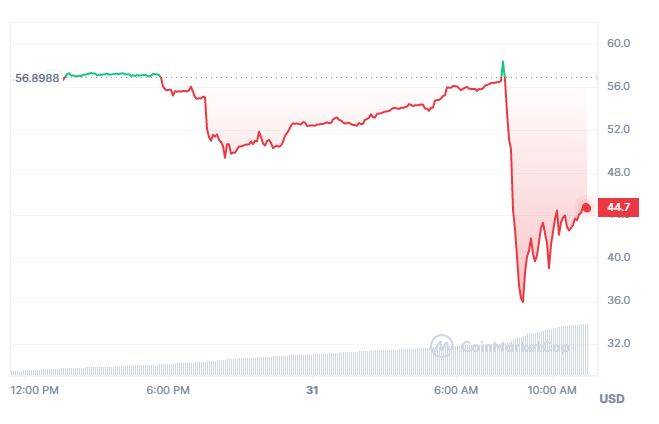- Bitget has announced the delisting of TokenFi (TOKEN), the token of an asset tokenization platform launched by Floki.
- The exchange accuses the team behind TOKEN of potential market manipulation and opaque vesting schedule.
- The price of TOKEN was $0.01806395 at the time of writing, having surged by 258% in the past 24 hours.
Bitget has announced the delisting of TokenFi (TOKEN), the tokenization platform recently launched by the team behind the meme cryptocurrency Floki.
The price of TOKEN on exchanges is currently $0.01806395, about 258% up in the past 24 hours. Bitget announced the listing of TokenFi on October 27.
Why did Bitget delist TOKEN
According to details in an announcement published on Tuesday, 0ctober 31, the decision to delist TOKEN relates to potential market manipulation by the project’s team.
“After the trading service of TokenFi (TOKEN) began, significant price fluctuations have been noticed. It was also found that the project team only added less than $2,000 in tokens to the liquidity pool of DEXes, and was suspected of market manipulation by maliciously controlling the initial liquidity,” Bitget wrote.
Other than the accusation of market manipulation via malicious compression of liquidity, the exchange also noted other possible issues around TokenFi. These include an opaque token economy and undisclosed vesting schedule.
TOKEN buyback launched
On top of halting deposit and trading for TokenFi (TOKEN) on October 31, Bitget has also canceled all pending orders.
The exchange also announced a TOKEN buyback program to be implemented before November 7, with an automatic swap of TOKEN into USDT undertaken.
“To be responsible for our users, after comprehensive consideration, Bitget has decided to delist TokenFi (TOKEN) and launch a buyback plan for users who hold the token on Bitget,” the crypto exchange added.
The swap price will be 1 TOKEN = 0.00605002 USDT, which is based on the highest closing price the token had in the five days after trading opened in the innovation zone.
Floki launched its tokenization platform on October 26, with the project aimed at capitalizing on the growing traction of an industry projected to hit $16 trillion by 2030. TOKEN has a total supply of 10 billion tokens, with 5 billion a piece on the BSC and ETH chains.
The post Bitget announces the delisting of Floki’s TokenFi (TOKEN) appeared first on CoinJournal.


